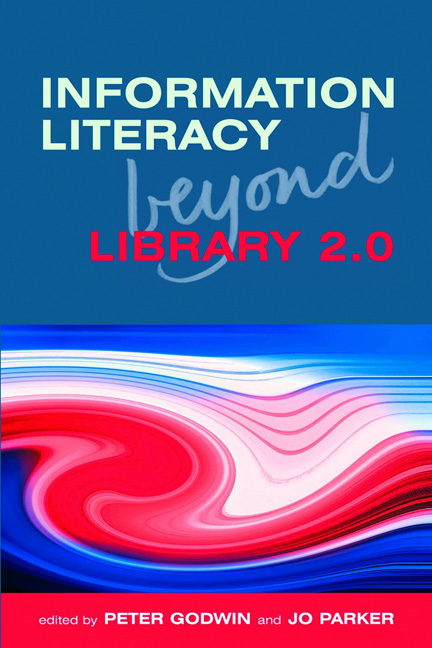Book contents
- Frontmatter
- Contents
- Contributors
- Acknowledgements
- Introduction
- PART 1 RECENT DEVELOPMENTS IN INFORMATION LITERACY AND LIBRARY 2.0
- PART 2 CASE STUDIES
- 7 Reinventing information literacy at UTS Library
- 8 Using games as treatments and creative triggers: a promising strategy for information literacy
- 9 Changing the conversation: introducing information literacy to a generation of smartphone users
- 10 Tweets, texts and trees
- 11 Referencing in a 2.0 world
- 12 Moving information literacy beyond Library 2.0: multimedia, multi-device, point-of-need screencasts via the ANimated Tutorial Sharing Project
- 13 Informed cyberlearning: a case study
- 14 An online course on social media for student librarians: teaching the information skills and literacies of social media
- 15 Transliteracy and teaching what they know
- 16 ANCIL: a new curriculum for information literacy: case study
- 17 TeachMeet: librarians learning from each other
- PART 3 WHAT IT MEANS FOR INFORMATION PROFESSIONALS
- Index
8 - Using games as treatments and creative triggers: a promising strategy for information literacy
from PART 2 - CASE STUDIES
Published online by Cambridge University Press: 09 June 2018
- Frontmatter
- Contents
- Contributors
- Acknowledgements
- Introduction
- PART 1 RECENT DEVELOPMENTS IN INFORMATION LITERACY AND LIBRARY 2.0
- PART 2 CASE STUDIES
- 7 Reinventing information literacy at UTS Library
- 8 Using games as treatments and creative triggers: a promising strategy for information literacy
- 9 Changing the conversation: introducing information literacy to a generation of smartphone users
- 10 Tweets, texts and trees
- 11 Referencing in a 2.0 world
- 12 Moving information literacy beyond Library 2.0: multimedia, multi-device, point-of-need screencasts via the ANimated Tutorial Sharing Project
- 13 Informed cyberlearning: a case study
- 14 An online course on social media for student librarians: teaching the information skills and literacies of social media
- 15 Transliteracy and teaching what they know
- 16 ANCIL: a new curriculum for information literacy: case study
- 17 TeachMeet: librarians learning from each other
- PART 3 WHAT IT MEANS FOR INFORMATION PROFESSIONALS
- Index
Summary
Introduction
How do librarians build creativity into information literacy (IL) and keep students engaged so that they learn and retain valuable, transferable IL skills? As teaching librarians, we should be exploring whether there are more creative IL teaching approaches that we can adopt in order to foster effective teaching and engagement, and to cultivate more opportunities for creative thinking about information-seeking concepts amongst students. Teaching librarians want to empower students with lifelong research skills, in a context where many higher education students are becoming more disengaged. Facilitating creativity and innovation is also now expected in the educational setting (Barrett and Donnelly, 2008).
In this chapter, some dimensions of educational games will be explored. New game ideas, specifically designed for face-to-face IL sessions, will be presented, with an illustration showing games used with Irish nursing and midwifery students. Finally, the chapter will explore Library 2.0 and 3.0 initiatives that may assist teaching librarians to encourage the widespread adoption of IL games.
The objective of this chapter is to prompt more teaching librarians to:
• become IL games advocates
• consider creating their own customized games for IL
• share and evolve their games and game-design skills for IL face-to-face sessions or smart learning environments, with the help of Library 2.0 and 3.0 initiatives
• use games to become leading innovative practitioners in higher education
and thus promote the value and expertise of librarians.
Games as educational treatments in IL
This section will cover how games treat disengagement, trigger creativity and innovative thinking, cultivate effective learning and provide inherent benefits and retention and knowledge transfer properties. It will also detail some of the challenges in using games and the overall benefits of games for librarians and libraries.
Games treat disengagement
Librarians involved in IL delivery look to best practice in education so as to draw on pedagogical tools and solutions appropriate for IL. Student disengagement is a growing challenge in higher education generally, and with IL in particular. The new generation of students is characterized as having low boredom thresholds (Fink, 2003) and there is evidence that some lectures are ineffective, especially for these learners (Smith, 2007). As Barrett and Donnelly (2008) state: ‘Pedagogy should be focused on arousing student imagination and engagement.’ Games that have an educational intent provide a platform for active learning, where students can discover IL concepts in an engaging way.
- Type
- Chapter
- Information
- Information Literacy Beyond Library 2.0 , pp. 91 - 102Publisher: FacetPrint publication year: 2012

